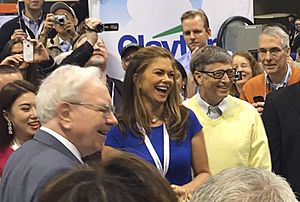Warren Buffett facts for kids
Quick facts for kids
Warren Buffett
|
|
|---|---|
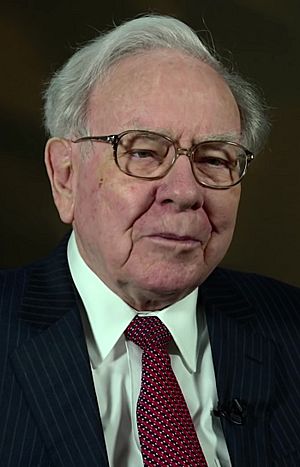
Buffett in 2015
|
|
| Born |
Warren Edward Buffett
August 30, 1930 Omaha, Nebraska, U.S.
|
| Education | |
| Occupation |
|
| Years active | 1951–present |
| Known for | Berkshire Hathaway |
| Political party | Democratic |
| Spouse(s) |
Susan Thompson Buffett
(m. 1952; died 2004)Astrid Menks Buffett
(m. 2006) |
| Children |
|
| Parent(s) |
|
| Relatives |
|
| Family | Buffett family |
| Signature | |
Warren Edward Buffett (born August 30, 1930) is an American businessman, investor, and philanthropist. He is the chairman of Berkshire Hathaway, a company that owns many other businesses. Because he has been so successful at investing, Buffett is one of the most famous investors in the world. Many people call him the "Oracle of Omaha" because of his amazing ability to pick good investments. As of May 2025, he was one of the richest people in the world.
Buffett was born in Omaha, Nebraska. His father, Howard Buffett, was a U.S. congressman and a businessman. From a young age, Warren was interested in business and making money. After college, he studied at Columbia Business School with a famous investor named Benjamin Graham. Graham taught him about value investing, which is the idea of buying parts of a business (called stocks) for less than they are really worth. This became the main idea behind all of Buffett's future success.
He is known for his smart investing and for living a simple life. He has promised to give away almost all of his money to help others. In 2010, he and Bill Gates started The Giving Pledge. This is a promise made by some of the world's wealthiest people to give away at least half of their money to charity. In 2025, Buffett announced that Greg Abel would take over as the CEO of Berkshire Hathaway, while Buffett would remain as chairman.
Contents
Early Life and First Businesses
Buffett showed an interest in business from a very young age. When he was seven, he was inspired by a library book called One Thousand Ways to Make $1000. As a boy, he started many small businesses. He sold chewing gum, Coca-Cola bottles, and magazines from door to door. He also worked in his grandfather's grocery store.
While he was in high school, he delivered newspapers, sold golf balls and stamps, and detailed cars. On his first tax return in 1944, he deducted $35 for the use of his bike and watch on his paper route. When he was a sophomore, he and a friend bought a used pinball machine for $25. They placed it in a barber shop, and it was so popular that they soon owned several machines in different shops.
His father wanted him to go to college, so Buffett studied business at the University of Nebraska. Even before he finished college, he had already saved almost $10,000 from his businesses and investments.
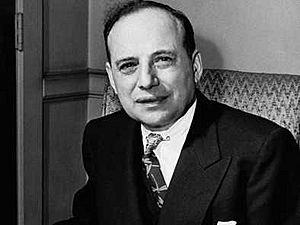
After graduating, he wanted to learn more from his hero, Benjamin Graham. He went to Columbia University to be Graham's student. Buffett said that Graham taught him the most important ideas about investing. These ideas were to think of stocks as owning a piece of a business, not just a piece of paper, and to always buy with a "margin of safety," meaning you pay much less than you think the business is worth.
Building a Business Empire
Early Career
After college, Buffett worked for his father's company and later for his mentor, Ben Graham. When Graham retired, Buffett moved back to Omaha and started his own investment companies, called partnerships. He was very successful. In 1959, he met Charlie Munger, who would later become his lifelong friend and business partner at Berkshire Hathaway.
One of his early smart investments was in the Sanborn Map Company. He realized that the company's investments were worth more than the total price of the company's stock. He bought a lot of the stock, convinced other leaders to make changes, and made a 50% profit in two years.
Berkshire Hathaway
In 1962, Buffett began buying stock in a textile company called Berkshire Hathaway. The company wasn't doing well, but Buffett saw that it was worth more than its stock price. He eventually took control of the company. He later said that buying the textile business was not his best idea, but he used Berkshire Hathaway as a base to buy other businesses, especially in insurance.
Over the years, Buffett and Munger turned Berkshire Hathaway from a failing textile mill into a giant holding company. A holding company owns a variety of other companies. Some of Berkshire Hathaway's famous investments include:
- The Coca-Cola Company: In 1988, Buffett started buying Coca-Cola stock. It became one of his most successful investments ever.
- ABC: In 1985, he helped a smaller company, Capital Cities, buy the much larger TV network ABC.
- BNSF Railway: In 2009, Berkshire Hathaway bought the huge railroad company BNSF.
Buffett is known for being a long-term investor. He likes to buy good companies and hold on to them for many years.
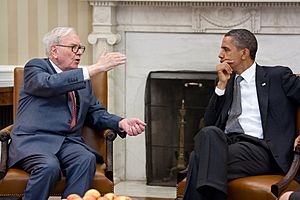
Investing During Tough Times
During the financial crisis of 2007-2008, when many people were scared to invest, Buffett saw opportunities. He invested billions of dollars in major American companies like Goldman Sachs and General Electric. He wrote an article for The New York Times with the headline, "Buy American. I am." This showed his faith in the country's economy.
His company, Berkshire Hathaway, became stronger after the crisis. By 2014, its stock price reached $200,000 per share for the first time.
Investment Philosophy
Buffett's ideas about investing are studied by people all over the world. He likes to keep things simple. Here are some of his main principles:
- Invest in what you understand. Buffett famously avoided investing in technology companies for many years because he said he didn't understand them well enough. (He later did invest in Apple and IBM).
- Look for companies with a long-term advantage. He likes businesses that have a strong brand or a special product that is hard for others to copy.
- Think like an owner, not a trader. He buys stocks with the idea of owning a piece of the business forever.
- Be patient. He is not in a hurry to sell. He once said, "Our favorite holding period is forever."
For people who are not professional investors, Buffett recommends a simple strategy: put your money in a low-cost index fund. An index fund owns small pieces of many large companies, so it spreads out the risk. He even made a bet that over 10 years, a simple S&P 500 index fund would perform better than special funds run by experts, and he won.
Personal Life
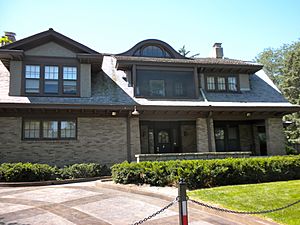
Despite his immense wealth, Buffett is known for his simple and frugal lifestyle. He still lives in the same house in Omaha, Nebraska, that he bought in 1958 for $31,500. He is known for drinking several cans of Coca-Cola a day and eating at fast-food restaurants.
In 1952, he married Susan Thompson, and they had three children: Susie, Howard, and Peter. Susan passed away in 2004. In 2006, Buffett married his longtime companion, Astrid Menks.
Buffett has some interesting hobbies. He loves to play the ukulele and is also an expert bridge player. He says he spends about 12 hours a week playing bridge, sometimes with his friend Bill Gates. He is also a huge fan of Nebraska Cornhuskers football.
For many years, Buffett worked with others to create an animated series called "Secret Millionaires Club." In the show, an animated version of Buffett teaches children good financial habits.
Giving Back: A Life of Philanthropy
Buffett plans to give away more than 99% of his fortune. He has said, "I want to give my kids just enough so that they would feel that they could do anything, but not so much that they would feel like doing nothing."
In 2006, he made one of the largest charitable donations in history. He pledged to give away the majority of his fortune, worth tens of billions of dollars, to the Bill & Melinda Gates Foundation. This foundation works to improve health and reduce poverty around the world.
In 2010, Buffett and Bill and Melinda Gates started The Giving Pledge. It is a public promise by the world's wealthiest individuals and families to dedicate the majority of their wealth to charitable causes.
He also supports foundations run by his children, which work on a variety of causes. One of the most famous ways he raises money for charity is by auctioning off a lunch with himself. People have paid millions of dollars for the chance to have a meal with him and ask for his advice. The money goes to the Glide Foundation, which helps the poor and homeless in San Francisco.
Political Views
Buffett has supported political candidates from both the Democratic and Republican parties. He served as an advisor to Republican Arnold Schwarzenegger when he was governor of California, and he supported Democrats Barack Obama and Hillary Clinton for president.
He is most famous for his views on taxes. He believes that wealthy people should pay a higher percentage of their income in taxes. He pointed out that he paid a lower tax rate than his secretary, which he did not think was fair. This idea became known as the "Buffett Rule."
He also believes that the government should help make sure that everyone has a chance to succeed. He once said, "The obligation of a society as prosperous as ours is to figure out how nobody gets left too far behind."
Warren Buffett Quotes
- "It takes 20 years to build a reputation and five minutes to ruin it."
- "Take the job that you would take if you were independently wealthy."
- "Criticize by category — praise by name."
- "Rule No.1: Never lose money. Rule No.2: Never forget rule No.1."
- "People will always try to stop you doing the right thing if it is unconventional."
See also
 In Spanish: Warren Buffett para niños
In Spanish: Warren Buffett para niños
 | Emma Amos |
 | Edward Mitchell Bannister |
 | Larry D. Alexander |
 | Ernie Barnes |


